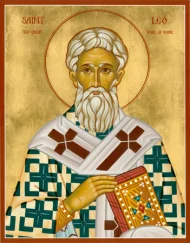 “The Son of Man is come to seek and to save that which is lost” (Luke 19:10). This is the exceedingly sweet voice of the Gospel.
“The Son of Man is come to seek and to save that which is lost” (Luke 19:10). This is the exceedingly sweet voice of the Gospel.
[…] But let us see what the Gospel is, and what it requires of us, and to whom it is rightly preached.
From its very name the Gospel is the gladdest of tidings. To all the world it preaches Christ the Saviour of the world Who came to seek out and to save the lost.
Listen all you lost sinners, listen to that exceedingly sweet voice of the Gospel! It cries out to us all, “The Son of Man is come to seek and to save that which is lost.”
It is a fearful thing for us to be found in sin before God. The Gospel preaches that our sins are forgiven for Christ’s name’s sake and that Christ is our justification before God.
In Thee, my Saviour, Jesus Christ, the Son of God, am I justified. Thou art my truth and enlightenment.
It is a fearful thing for us to be found at enmity with God. The Gospel preaches that Christ has reconciled us to God, and having come He preached peace to all near and far.
A fearful thing for us is the curse of the Law, for we are all sinners; it subjects the sinner to both temporal and eternal punishment. The Gospel preaches that Christ redeemed us from the curse of the Law, having become the curse for us.
A fearful thing for us is death. The Gospel preaches that Christ is our resurrection and life.
A fearful thing for us are Gehenna and hell. The Gospel preaches that Christ delivered us from hell and all its calamities.
It is a fearful thing for us to be separated from God. The Gospel preaches that we shall be with the Lord always in His eternal Kingdom.
This, blessed Christians, is the most sweet voice of the Gospel, “Taste,” then, “and see that the Lord is good” (LXX Psalm 33:9 [KJV Psalm 34:8]).
“For God so loved the world, that He gave His Only Begotten Son, that whosoever believeth in Him should not perish, but have everlasting life. For God sent not His Son into the world to condemn the world; but that the world through Him might be saved. He that believeth on Him is not condemned” (John 3:16-18).
“Blessed be the Lord God of Israel, for He hath visited and redeemed His people, and hath raised up an horn salvation for us in the house of His servant David” (Luke 1:68-69).
Tikhon of Zadonsk (1724-1783; Russian Orthodox): extract @ Kandylaki from Journey to Heaven: Counsels On the Particular Duties of Every Christian by Our Father Among the Saints, Tikhon of Zadonsk, Bishop of Voronezh and Elets (Jordanville, NY: Holy Trinity Monastery, 2004) .














